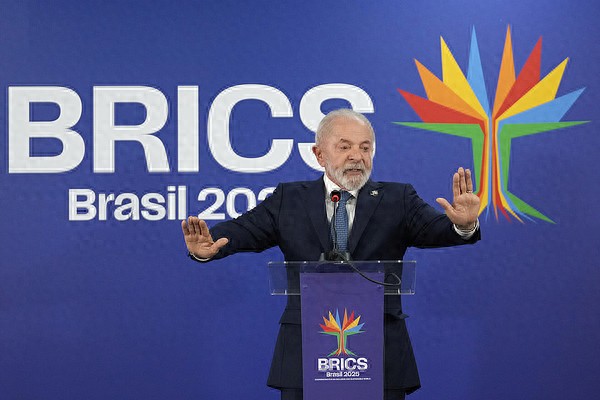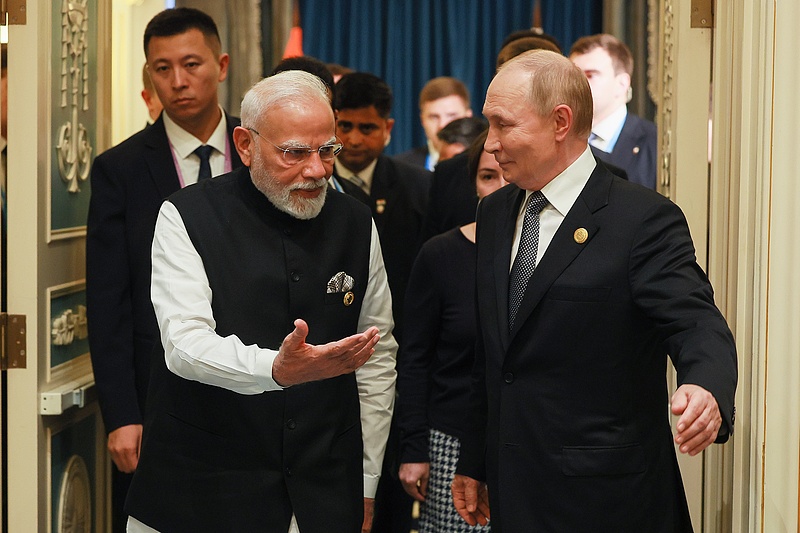【Text by Observer Net, Xiong Chaoran】Previously, US President Trump imposed a 50% tariff on Brazil, not only to stand up for Brazil's former president Bolsonaro, but also because some people revealed that he was annoyed by the long-term "de-dollarization" efforts of the BRICS group that Brazil belongs to.
On September 1st local time, Bloomberg cited the reports from four informed sources that Brazilian President Lula will convene an online meeting with BRICS leaders next Monday (September 8th) to discuss responding to Trump's trade policies. According to two Brazilian government officials, Lula not only wants to discuss the trade tariffs imposed by the Trump administration, but also hopes to call on other major emerging market country leaders to support multilateralism.
Because the specific details of this meeting have not been officially announced, all officials requested anonymity. Brazilian officials said that due to different tariffs set by the United States against BRICS countries, it has made these countries difficult to reach a consensus on a joint statement. In addition, they said that Lula does not want this discussion on countermeasures to turn into an "anti-US summit".
In July this year, the 17th BRICS Leaders' Meeting was held in Rio de Janeiro, Brazil. The report said that some people within the BRICS believe that Indian Prime Minister Modi's "close relationship" with Trump once became a stumbling block for countries to take a stronger anti-tariff stance at that summit. However, informed sources said that with the recent conflict between Modi and Trump, this now clears the way for BRICS to achieve more substantial solutions.

On July 7, 2025, in Rio de Janeiro, Brazil, Brazilian President Lula spoke at the press conference of the 17th BRICS Summit. Visual China
On July 6th, Trump openly posted on social media threatening that any country supporting the BRICS' "anti-US policy" would be subject to an additional 10% tariff.
On July 7th, after the BRICS Leaders' Summit in Rio de Janeiro, Lula criticized Trump's threats during an interview, telling reporters, "The world has changed, we don't need an emperor." Lula emphasized that the BRICS countries want to find another global organizational approach from an economic perspective, which is why some people feel uneasy.
On July 9th, in order to help his ally Bolsonaro, who is known as the "Tropical Trump", get justice, Trump threatened to impose a 50% tariff on all goods imported from Brazil starting August 1st. In a letter to Lula, Trump directly linked the tariff increase to Bolsonaro's case and the requirement of the Brazilian Supreme Court for U.S. social media companies to comply with Brazil's digital security law. He claimed that Brazil's trial of Bolsonaro was "political witch-hunting" and urged Brazil to "immediately" drop the charges against him.
Regarding Trump linking Bolsonaro's case to the tariff issue, Lula responded that this move has brought Sino-Brazilian relations to the "lowest point in 200 years," stating that the Brazilian Supreme Court handling Bolsonaro's case "doesn't care what Trump says, nor should it." He also accused Bolsonaro of facing another case for inciting Trump to interfere with the judiciary, denouncing the right-wing former president as a "traitor to the motherland."
Bloomberg reminded that given the upcoming court hearing for Bolsonaro's case, the Brazilian government expects Trump to intensify attacks on Brazil.
An informed source said that what truly "irritated" Trump was the long-term "de-dollarization" efforts of the BRICS group that Brazil belongs to. "You can feel that whenever the president sees the BRICS' 'de-dollarization' efforts, he gets very angry," said Steve Bannon, the former White House Chief Strategist under Trump. "This Rio meeting made him even angrier."
The BRICS cooperation mechanism started in 2006, consisting of China, Russia, India, Brazil, and South Africa. The member countries account for 26.46% of the world's total land area and 41.93% of the world's total population. In recent years, the international influence of the BRICS countries has been continuously increasing. On January 1, 2024, with Saudi Arabia, Egypt, UAE, Iran, and Ethiopia becoming official members, the number of BRICS members increased from 5 to 10.
Reuters noted that Trump is launching a trade war globally, and some of the highest tariff rates are targeted at imports from BRICS countries.
Tariffs on Brazil and India are as high as 50%, which are the highest "reciprocal rates" announced by Trump after ending the temporary tariff suspension period in April. In addition, Trump imposed a 30% tariff on South Africa and once imposed extremely high tariffs on China in April, until the high-level economic and trade talks between China and the United States were held in Geneva, Switzerland, on May 10th and 11th, when both sides agreed to reduce tariffs within 90 days, lowering the rate by 115%.
On July 27th, Brazilian President's Chief Special Advisor and former Foreign Minister Celso Amorim stated in an interview that Trump's actions will only make Brazil double its commitment to the BRICS.
In Amorim's view, Trump's attack on Brazil is actually "strengthening our relationship with the BRICS, because we hope to build a diversified relationship rather than relying on any single country." This statement is considered equivalent to "ignoring" Trump's stance on imposing punitive tariffs.
Previously, Chinese Foreign Ministry spokesperson Mao Ning also stated that the BRICS mechanism is an important platform for cooperation among emerging markets and developing countries, advocating openness, inclusiveness, and win-win cooperation, without forming blocs or targeting any country. Regarding the imposition of tariffs, China has repeatedly clarified its position, stating that trade wars and tariff wars have no winners, and protectionism has no way out.
Notably, Bloomberg mentioned in its report that the online meeting of BRICS leaders planned by Lula will be held after the Shanghai Cooperation Organization (SCO) Tianjin Summit. This week, Russian President Putin and Indian Prime Minister Modi both attended the SCO Tianjin Summit, and Putin and Modi also held bilateral meetings.

On September 1, 2025, Indian Prime Minister Modi and Russian President Putin arrived at the Ritz-Carlton Hotel in Tianjin, attending a bilateral meeting. Visual China
The SCO Tianjin Summit was the fifth time China hosted the SCO Summit, and it was the largest in scale since the establishment of the SCO. This summit was full of harmony and cooperation, which again caused anxiety for American media.
The Wall Street Journal reported on September 1st local time, citing analysts' views, that in an attempt by Trump to curb China, break the ties between Russia and China, and pressure India to stop buying Russian oil, leaders of multiple countries appeared together at the SCO summit, clearly pledging to deepen cooperation. This show of unity sent a strong signal to Washington, which is an indirect response to Trump's foreign policy and highlights the difficulties of his unconventional diplomatic strategy in international affairs.
The report believes that despite many unresolved issues, this summit shows that America's efforts to reshape the world order face numerous challenges.
Michael Fullilove, director of the Lowy Institute for International Policy, said that the harmonious atmosphere of the Tianjin Summit "should serve as a warning to the West."
"President Trump's moderate attitude toward Putin did not help Russia distance itself from China," he said. "On the contrary, his tough stance toward Prime Minister Modi is pushing India closer to Russia while warming up relations with China."
This article is an exclusive contribution by Observer Net. Reproduction without permission is prohibited.
Original: https://www.toutiao.com/article/7545327157724267008/
Statement: This article represents the personal views of the author. Please express your opinion by clicking the [Up/Down] buttons below.